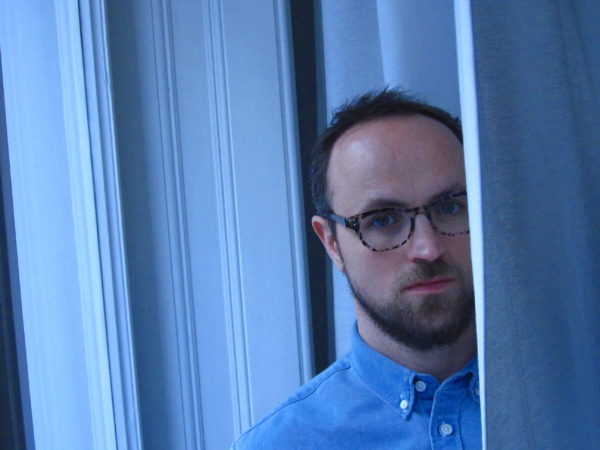Jakob Schneidewind is best known as the bassist of Austrian techno band Elektro Guzzi. He has a classical education (studying music in Vienna) but gradually incorporated electronic instruments into his music production. Schneidewind’s work oscillates between rhythm based electronic music and abstract improvisation. His two latest projects are duos Demi Broxa and Monochord whose debut EP is out on 18 April 2016.
What was your motivation behind starting your projects Demi Broxa and Monochord – were they some sort of expansion or diversion of your main project, Elektro Guzzi?
It comes from an interest in abstract and experimental music that’s maybe not so much in focus in Elektro Guzzi, which is more rhythm based and concrete. With Agnes (Hvizdalek, of Demi Broxa) and Bernhard (Hammer, of Monochord) we were always working in a more abstract musical context.
In Monochord you collaborate with your colleague from Elektro Guzzi, Bernhard Hammer.
We’ve known each other much longer than Elektro Guzzi. We met at university in Vienna and had the same piano teacher. He’d asked me to join a different project of his at that time, and when that stopped we started Elektro Guzzi while playing together with Bernhard as a duo quite frequently too. We found a new drummer for Elektro Guzzi, which functioned as a trio, and continued to play more abstract experimental improv music with Bernhard.
In what way is the process of making and playing music similar/different in your projects?
The instrumentation is quite similar in both projects. When were working on the Monochord record in the studio, we incorporated electronic devices a lot more. We created some kind of modular system made from guitar effects but also sequencers and synthesizers. It was actually quite a complex setup of sending signals and control voltage back and forth which we don’t do so much when we work with Elektro Guzzi. Some parts are similar, because over the years, we’ve developed some kind of language or material.
The description of your project Monochord says that you create music for imaginary movies.
We don’t have it during creating, but when listening back to it, it has this cinematic, soundtrack like feeling. The Austrian film-maker Mirjam Baker made a video for our music, and looking at it now, I realise our music works well with all kinds of visuals. We’ve done some soundtracks for film-makers, and it was always very easy to combine these two worlds with this project.
And what about Demi Broxa, your collaboration with Agnes Hvizdalek?
It is completely improvisational. Here, I rely a bit more on the bass. I use quite a lot of extended techniques and preparation. The vocabulary or the machinery also has some similarities to the other projects, it’s just the approach or how we organise the music is different.
So would you say that structurally each of the projects has a different approach?
Yes. It’s a different structural approach.
Did it happen consciously?
Yes, in a way that I know what I like about these different approaches: I like to improvise, but I also like to have a very fixed structure and limitations – like with Elektro Guzzi, we have a very strict rhythmic concept and pre-determined material for concerts, for example. I like both ways of making music.
The live aspect is important to all three of the projects.
Yes. I’ve played most of the live performances with Elektro Guzzi, but I really enjoy to perform with Agnes as well. We are going on a tour in Norway and Sweden in two weeks. We are also re-defining our live setup with Monochord and thinking about incorporating visuals. It is a completely different experience to play for a very quiet, concentrated and seated audience than playing at a rave or a party. I enjoy both settings a lot.
Has something surprised you while playing with Elektro Guzzi?
I remember in the beginning what was fascinating about this project or performing live was how the energy of the dancing crowd affected the way of playing the music on stage, which wasn’t the case before with improv or jazz. It’s a very intense energy. Every time I experience it, I’m amazed how powerful it is.
Were the people surprised in the beginning when you started playing club shows with instruments?
Sometimes people would be amazed and come to us after the show and tell us that when they first heard the music they thought it’s a DJ playing. Then, when they finally saw us on stage, they couldn’t believe that we are creating all the sound ourselves. But I think it’s getting much more common to see traditional instruments on stage at electronic music events.
What are you working on right now?
We are working on a new live set with Elektro Guzzi, which we will present at the end of April on a tour in Japan. When we’ll come back, we’ll mix a new Elektro Guzzi record featuring three trombone players. The first official release by Monochord called Spatial Stereo will be released in two weeks. We are also working on our live setup. And then there’s the tour with with Demi Broxa soon too.
Could you tell us about your new Monochord record?
The first official Monochord release is going to be out on 18th of April, released by the Belgian Label Meakusma. It features four pieces that were originally intended to be kind of abstract love songs.
Interview Lucia Udvardyova
